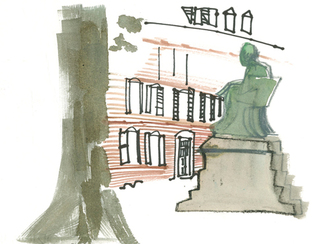 loading
loading
A rebel comes home Annabel WrightView full imageI’d like to say that the highlight of my metaphoric return to the New Haven fold happened in 2011, when I attended my first reunion, my 35th. One of the organizers had thought it would be fun to ask some alums to give quick talks on their own lives—and included me. I was honored. And so there I was one day, on stage in a lecture hall I’d never seen, but whose woodwork was so somehow welcoming that it struck some Jungian archetypal chord. I was amid scientists and well-known authors and world-changers, giving their own presentations. And even if my only Times bestseller was cowritten with a famous football player, and my only really good book is out of print, and my imprint on history will be negligible, I think I held my own that day. I was back at Yale, as a Yalie. A few minutes after the presentation, I bought my first Yale sweatshirt. I had realized I finally deserved one. But, in truth, the real highlight of my return to Yale came last spring. A student I’d taught asked me to meet her for lunch up at Hotchkiss. She had something she wanted to tell me. Tori had been in both my English and my history classes, and I’d directed her in plays. She was everything I hadn’t been in ninth grade: studious, funny, diligent, modest, analytic, optimistic, and certain that she would change the world—not that she’d ever say so aloud. I spotted her in the back of the dining hall, waiting for me, waving. She was wearing a Yale sweatshirt. Yale, she knew, was where she belonged, and she wanted me to know it. Postscript: a few months ago, at the end of the fall term, she told me she loves the place. Will she be a renegade? Nah. I think she might be a governor. And damn, will I be proud of her. And where do I belong? With my wife of 30 years in our creaky old house, with our three chickens, in a small village where I serve on a municipal board, publish the occasional essay in the local paper, and try to give back whatever I can to a place that has generously welcomed me. My village is an institution that has taught me to think, reason, and grow; to understand that while an ideal is fine to aim for, an idea, developed by neighbors and friends, is more valuable for the tribe. My village is singular in its ability to educate me, a man in his sixth decade of life. From my four peers on the Village Planning Board (their collars come in all colors), I’ve learned that wisdom is useless if it doesn’t advance community—no matter what, or who, comprises that community. Maybe it took me longer than most to see where I’d come from. Hey, we all have different timeframes. Mine’s just beginning.
The comment period has expired.
|
|